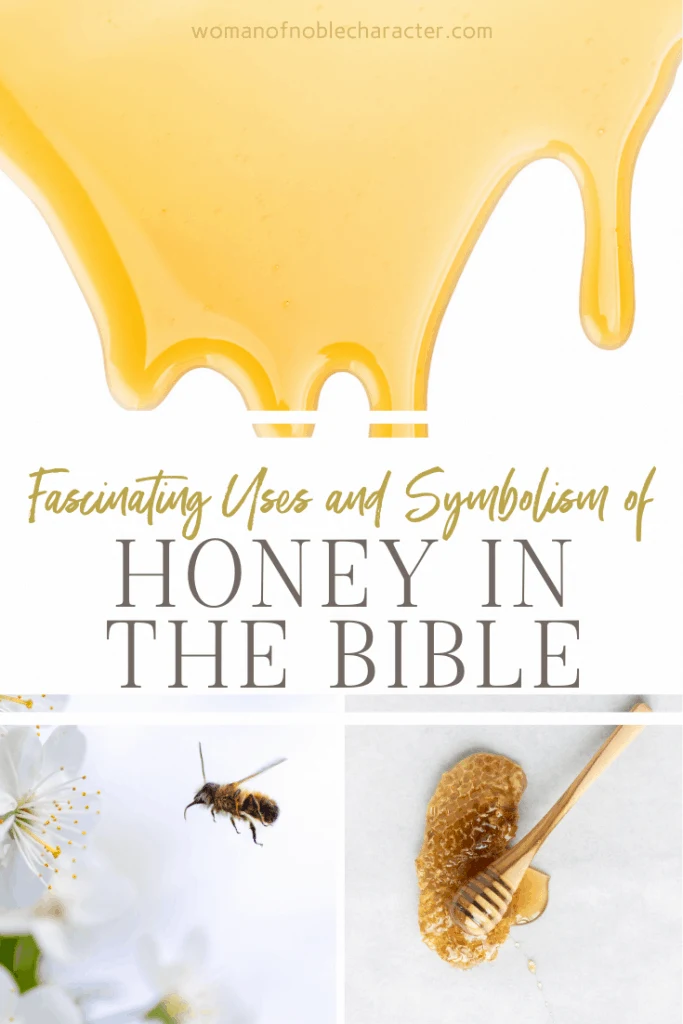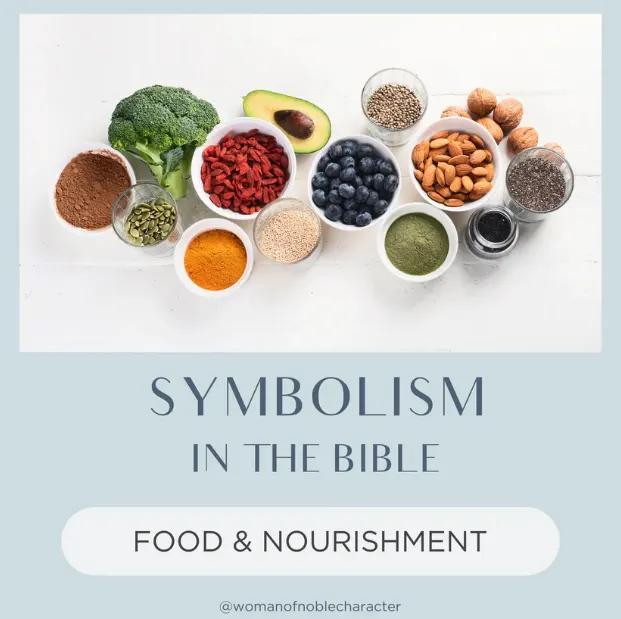This page/post may contain affiliate links. As an Amazon Associate, as well as an affiliate of other programs, this means if you purchase something using these links, I will receive a commission on qualifying purchases at no cost to you! For more detailed information, please visit our Affiliate Disclaimer page
We’ve all heard about the land of milk and honey in the Bible, the promised land, but there are dozens more scripture references to honey, its uses, and the symbolism of honey in the Bible. In fact, honey is mentioned at least 61 times in the Bible.
This post is part of a series on food and symbolism in the Bible. You can find previous posts on wine in the Bible, bread in the Bible, and milk in the Bible.
Before we get into the symbolism and uses of honey in the Bible, let’s take a look at where the Bible says we can find much honey.
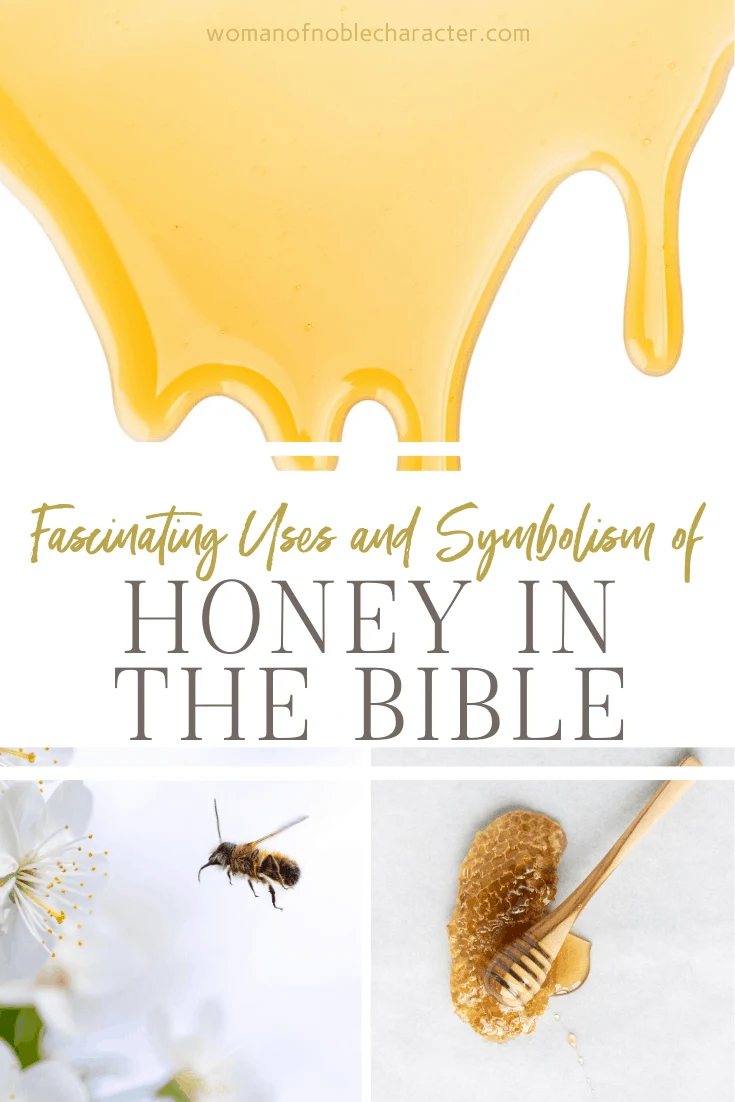
Where the Bible Says We Can Find Honey:
Primarily, scripture points out three places where we can find honey.
1) Rocks
“He made him ride on the heights of the land
Deuteronomy 32:13 (ESV)
and fed him with the fruit of the fields.
He nourished him with honey from the rock,
and with oil from the flinty crag,”
“But you would be fed with the finest of wheat;
Psalm 81:16 (ESV)
with honey from the rock I would satisfy you.”
2. Woods
“The entire army entered the woods, and there was honey on the ground. When they went into the woods, they saw the honey oozing out; yet no one put his hand to his mouth, because they feared the oath.
1 Samuel 14:25-26 (ESV)
3. Carcases of Dead Animals
“Some time later, when he went back to marry her, he turned aside to look at the lion’s carcass, and in it he saw a swarm of bees and some honey.”
Judges 14:8 (ESV)
Because the Bible is filled with uses and symbolism of honey, we’ll break it down a bit further. First, we’ll look at the symbolism of honey in the Bible. I can find five main symbolic categories of the symbolism of honey in the Bible.
Symbolism of Honey in the Bible
1) Symbol of Abundance or Plentitude
We have all heard of the land where honey and milk flow. It’s a metaphor used at least twenty-one times in the Bible, symbolizing abundance or having plenty.
Then the Lord said, “I have surely seen the affliction of my people who are in Egypt and have heard their cry because of their taskmasters. I know their sufferings, and I have come down to deliver them out of the hand of the Egyptians and to bring them up out of that land to a good and broad land, a land flowing with milk and honey, to the place of the Canaanites, the Hittites, the Amorites, the Perizzites, the Hivites, and the Jebusites.’
Exodus 3:7-8 (ESV)
We also find it in Job:
“He will not look upon the rivers,
Job 20: 17 (ESV)
the streams flowing with honey and curds.”
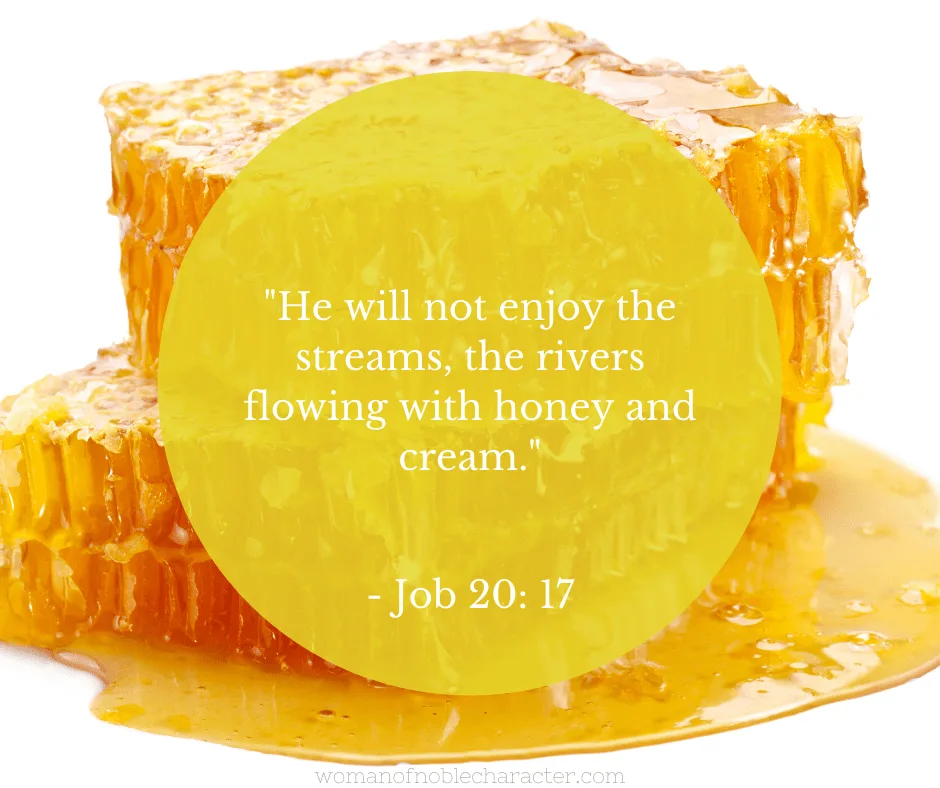
2) The Word of God
Nothing is sweeter than the beautiful words of the God of Abraham. Scripture refers to God’s Word often as sweeter than honey as we can see in the following verses:
“the precepts of the Lord are right,
Psalm 19:8-10 (ESV)
rejoicing the heart;
the commandment of the Lord is pure,
enlightening the eyes;
the fear of the Lord is clean,
enduring forever;
the rules of the Lord are true,
and righteous altogether.
More to be desired are they than gold,
even much fine gold;
sweeter also than honey
and drippings of the honeycomb.”
“How sweet are your words to my taste,
Psalm 119:103 (ESV)
sweeter than honey to my mouth!”
3) Wisdom
Honey is also compared to or symbolized with wisdom.
“My son, eat honey, for it is good,
Proverbs 24:13-14 (ESV)
and the drippings of the honeycomb are sweet to your taste.
Know that wisdom is such to your soul;
if you find it, there will be a future,
and your hope will not be cut off.”
4) Pleasant Words or Metaphor For Sweetness
David, often used the sweetness of honey as a metaphor, as shown above when describing God’s Word. Solomon used this metaphor often, as well.
“Your lips drip nectar, my bride;
Song of Solomon 4:11 (ESV)
honey and milk are under your tongue;
the fragrance of your garments is like the fragrance of Lebanon.”
“Gracious words are like a honeycomb,
Proverbs 16:24 (ESV)
sweetness to the soul and health to the body.”

Interesting Fact About Honey as Sweet in the Bible:
There are two stories in the Bible where men were ordered to eat a book or a scroll! Scripture tells us:
“And he said to me, “Son of man, feed your belly with this scroll that I give you and fill your stomach with it.” Then I ate it, and it was in my mouth as sweet as honey.”
Ezekiel 3:3 (ESV)
“So I went to the angel and told him to give me the little scroll. And he said to me, “Take and eat it; it will make your stomach bitter, but in your mouth it will be sweet as honey.” And I took the little scroll from the hand of the angel and ate it. It was sweet as honey in my mouth, but when I had eaten it my stomach was made bitter.”
Revelation 10:9-10 (ESV)
5) The Lips of an Adulterous Woman
Don’t be swayed by the sweet-talking woman (or man) as they sound sweet, but will cause you to sin.
“For the lips of a forbidden woman drip honey,
Proverbs 5:3 (ESV)
and her speech is smoother than oil,”
Uses for Honey in the Bible
- An Honored or Esteemed Gift
Honey was seen as an honored gift. In fact, Jacob told his sons to take “….a little balm, a little honey…” as a present when they set off to visit their brother Joseph.
“Then their father Israel said to them, “If it must be so, then do this: take some of the choice fruits of the land in your bags, and carry a present down to the man, a little balm and a little honey, gum, myrrh, pistachio nuts, and almonds.”
Genesis 43:11 (ESV)
We also see it in Kings 14:3 when Jeroboam’s queen visited the blind Prophet Ahijah at Shiloh. She brought with her a small pot of honey in order to gain favor regarding her gravely ill son.
“‘Take with you ten loaves, some cakes, and a jar of honey, and go to him. He will tell you what shall happen to the child.”
1 Kings 14:3 (ESV)
2) Healthy Food
One of the most common references to honey in the Bible was as a food. In fact, we read that John the Baptist subsisted mainly on locusts and wild honey.
“ Now John was clothed with camel’s hair and wore a leather belt around his waist and ate locusts and wild honey.”
Mark 1:6 (ESV) (we find almost the exact scripture in Matthew 3:4)
On the day that Jesus rose from the dead and appeared before the Disciples, He asked for food. They gave Him broiled fish and a honeycomb. (Note: not all translations mention the honeycomb) Jesus ate the food to prove to the Apostles that He was truly resurrected and not merely a spirit or a mirage.
“But while they still did not believe for joy, and marveled, He said to them, “Have you any food here?” So they gave Him a piece of a broiled fish and some honeycomb. And He took it and ate in their presence. “- Luke 24: 42 NKJV
The prophet Isaiah also mentions honey and curds (or butter, depending on the translation you are using).
“In that day a man will keep alive a young cow and two sheep, and because of the abundance of milk that they give, he will eat curds, for everyone who is left in the land will eat curds and honey.
Isaiah 7:21-22 (ESV)
The Jews put aside honey for future use and is used to barter not to take their lives as they have saved provisions:
“But there were ten men among them who said to Ishmael, “Do not put us to death, for we have stores of wheat, barley, oil, and honey hidden in the fields.” So he refrained and did not put them to death with their companions.
Jeremiah 41:8 (ESV)
Even King David’s army was provided with honey as provisions during battle.
“brought beds, basins, and earthen vessels, wheat, barley, flour, parched grain, beans and lentils, honey and curds and sheep and cheese from the herd, for David and the people with him to eat, for they said, “The people are hungry and weary and thirsty in the wilderness.”
2 Samuel 17:28-29 (ESV)
Son of Sirach, in the Orthodox or Catholic Bible, called honey one of the principal things for use in a man’s life. It was critically important.
How Was Honey Eaten in The Bible?
We find quite a few references to how honey was eaten in the Bible.
1. Plain or on its own
“Then Jonathan said, “My father has troubled the land. See how my eyes have become bright because I tasted a little of this honey.”
1 Samuel 14:29 (ESV)
2. With the comb/whole honeycomb
“I came to my garden, my sister, my bride,
Song of Songs 5:1 (ESV)
I gathered my myrrh with my spice,
I ate my honeycomb with my honey,
I drank my wine with my milk.”
3. With milk
“Your lips drip nectar, my bride;
Song of Songs 4:11 (ESV)
honey and milk are under your tongue;
the fragrance of your garments is like the fragrance of Lebanon.”
4. With butter or curds
“He shall eat curds and honey when he knows how to refuse the evil and choose the good.”
Isaiah 7:15 (ESV)
“and because of the abundance of milk that they give, he will eat curds, for everyone who is left in the land will eat curds and honey.”
Isaiah 7:22 (ESV)
5. With locusts
“Now John wore a garment of camel’s hair and a leather belt around his waist, and his food was locusts and wild honey.”
Matthew 3:4 (ESV)
6. Mixed with flour
“Now the house of Israel called its name manna. It was like coriander seed, white, and the taste of it was like wafers made with honey.”
Exodus 16:31 (ESV)
“Thus you were adorned with gold and silver, and your clothing was of fine linen and silk and embroidered cloth. You ate fine flour and honey and oil. You grew exceedingly beautiful and advanced to royalty.”
Ezekiel 16:13 (ESV)
Click the image below for a 2-page downloadable, printable PDF with Bible verses about honey for deeper study, verse mapping or Bible journaling.
3) Honey as a Medicine or Healing Aid
Another prolific use of honey in the Bible was for healing. In fact, probably one of the most famous sayings from King Solomon was “Eat honey, my son, for it is good; honey from the comb is sweet to your taste”.
King Solomon also said:
“Gracious words are like a honeycomb,
Proverbs 16:24 (ESV)
sweetness to the soul and health to the body.”
In both of these scriptures, King Solomon is pointing out that honey is a medicine. It is good for our bodies.
Even descendants of Noah were aware that honey had medicinal properties: surviving records show how the ancient Egyptians used honey to prevent and cure various diseases and heal wounds.
Throughout the ages, people with open wounds have run the risk of serious infection spreading into their body, and even death. The ancients often used honey-based treatments to cure and heal wounds and other infections. Modern insights into honey’s amazing properties continue to be studied and tested. Raw honey contains five compounds that provide honey with amazing antibacterial properties.
God’s Rules About Honey
As with any of God’s gifts to us, He tells us not to abuse it. In regard to honey, there are really only two “rules” that I can find in study:
- Honey is not to be offered as or with any sacrifice
“No grain offering that you bring to the Lord shall be made with leaven, for you shall burn no leaven nor any honey as a food offering to the Lord.”
Leviticus 2:11 (ESV)
2) Honey is a First fruit and should be Offered to God.
This verse almost seems to contradict the first, but let’s take a closer look:
“As an offering of firstfruits you may bring them to the Lord, but they shall not be offered on the altar for a pleasing aroma.”
Leviticus 2:12 (ESV)
“As soon as the command was spread abroad, the people of Israel gave in abundance the firstfruits of grain, wine, oil, honey, and of all the produce of the field. And they brought in abundantly the tithe of everything.”
2 Chronicles 31:5 (ESV)
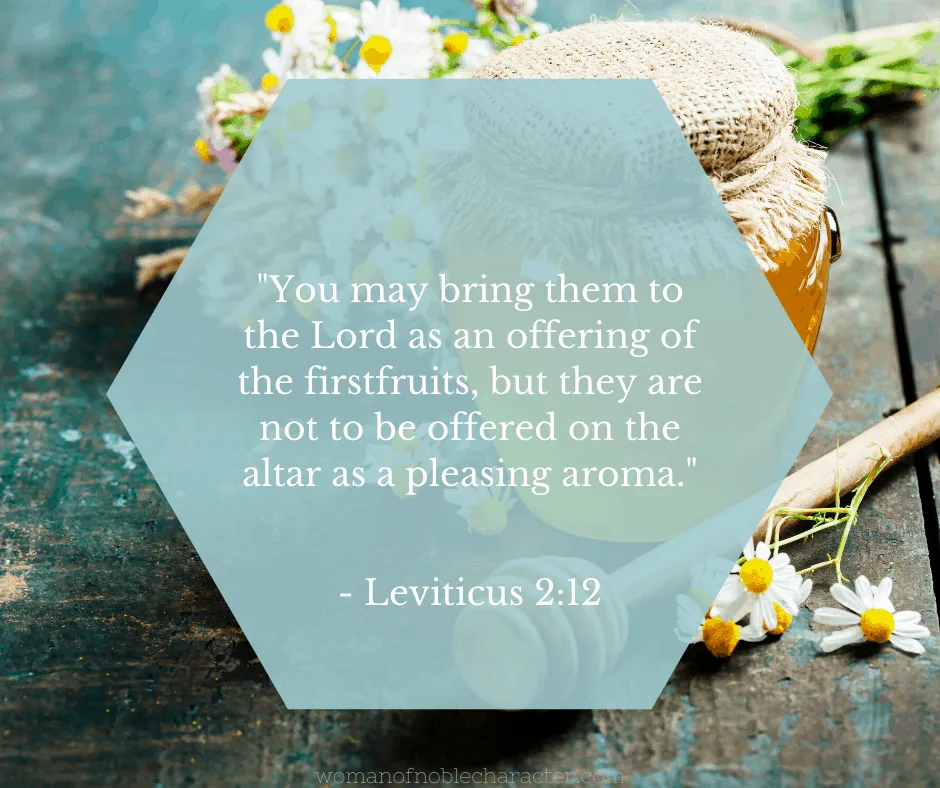
One may assume that the Jews used honey as a leavening for baking purposes. On the other hand, honey sacrifices were prohibited by the Jews as honey was liable to ferment.
So it seems that it may be offered as a first fruit, but not a burnt offering.
And, while not a “rule”, a good piece of advice:
On the other hand, eating too much is warned against in Proverbs 25:16:
“If you have found honey, eat only enough for you,
Proverbs 25:16 (ESV)
lest you have your fill of it and vomit it.”
Isn’t honey amazing? And, more amazing is that God created it for us. Another of God’s provision! One interesting note. The honey referenced in the land of Israel is most likely date honey and not bee honey! To learn about Him through symbolism. To eat. To use for healing. He thinks of our EVERY need. Yet, we, and the children of Israel, worry about silly things.
Another interesting tidbit, most of the biblical references to honey are found in the Old Testament. Very few are found in the New Testament.
Did you learn something new about honey in the Bible? If so, please share in the comments below.
Are You a Foodie? Do you want to learn more about food in the Bible and its symbolism?
A guide to the symbolism of many foods in the Bible, including milk, honey, bread, and more. Looking at scripture to describe food in biblical times and what it represents in our spiritual life.
You may enjoy this video: What is the meaning of honey in The Bible? | Short Bible Study
For deeper study on honey in the Bible, consider one of these recommended resources:
Scouting the Divine: My Search for God in Wine, Wool, and Wild Honey by Margaret Feinberg
Milk and Honey in the Land of Fire and Ice: Cultivating Sweet Spots of Christ-Centered Identity, Intimacy, & Influence in Every Season by Jenny Erlingsson
Taste and See: Discovering God among Butchers, Bakers, and Fresh Food Makers by Margaret Feinberg
Taste and see is an amazing biblical culinary adventure. If you love to cook and study the Bible, you will love this book!
Personally, I love my subscription to ArtzaBox. Each quarter includes food from Israel (their date honey is incredible), home decor, self-care, and faith-related items all from the Holy Land. No code is necessary for 20% off for my readers.
Because He Lives,
Sue
ESV – “Scripture quotations are from The ESV® Bible (The Holy Bible, English Standard Version®), copyright © 2001 by Crossway, a publishing ministry of Good News Publishers. Used by permission. All rights reserved.”

